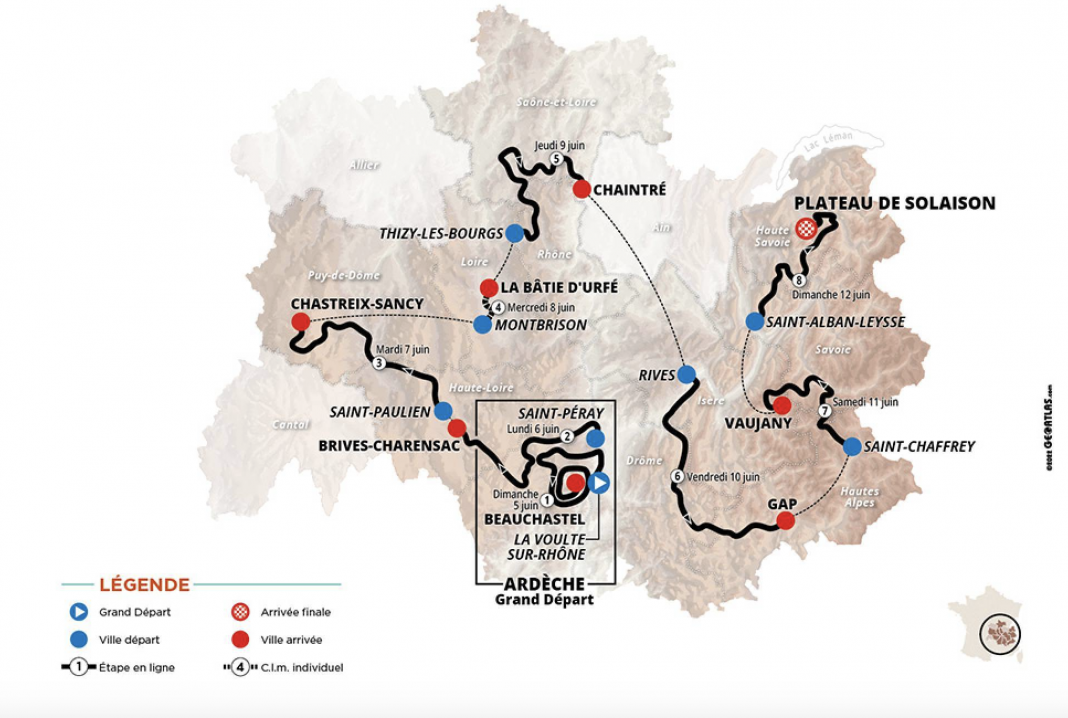Image 1 of 9 2022 Critérium du Dauphiné overall route map for eight days of racing (Image credit: Amaury Sport Organisation) Image 2 of 9 Stage 1 profile (Image credit: Amaury Sport Organisation) Image 3 of 9 Stage 2 profile (Image credit: Amaury Sport Organisation) Image 4 of 9 Stage 3 profile (Image credit: Amaury Sport Organisation) Image 5 of 9 Stage 4 profile for individual time trial (Image credit: Amaury Sport Organisation) Image 6 of 9 Stage 5 profile (Image credit: Amaury Sport Organisation) Image 7 of 9 Stage 6 profile (Image credit: Amaury Sport Organisation) Image 8 of 9 Stage 7 profile (Image credit: Amaury Sport Organisation) Image 9 of 9 Stage 8 profile (Image credit: Amaury Sport Organisation) The 2022 Critérium du Dauphiné returns for a 74th edition and over the past decade has served as the main preparation contest for the Tour de France. This year the route covers 1,190. 2 kilometres and a barrage of climbing.
Stage 1 will begin from La Voulte-sur-Rhône for 192km on stage 1, a first-ever start in Ardèche. The peloton will embark on two separate loops, with a first pass across the finish line after 130km. The riders will climb the Côte de Chambon de Bavas twice (4.
8km at 5. 2%), then follow wide, straight roads on the banks of the Rhône for the finish in Beauchastel. Stage 2 is a hilly 170km ride from Saint-Péray to Brives-Charensac with four categorised climbs.
The first up are back-to-back category 3 climbs that await 56km into the route that are separated by just 7. 5km – the Côte de Désaignes (5km at 4. 3%) followed by the Côte de Saint-Agrève (5.
6km at 4. 7%). A descent into Le Chaylard then launches the peloton toward the 11.
6km climb of the category 2 Col de Mézilhac (4. 1%). It’s an uphill ride of14.
5km to the intermediate sprint at Le Gerbier de Jonc, then a bumpy descent toward a slight category 4 challenge at Côte de Rohac that is just nine kilometres from the line in Brives-Charensac. Day three is the first true battleground for the climbers, which is expected across a hilly 164 kilometres and culminating on the slopes of the category 2, 6. 2km climb to Puy de Sancy.
After a third-category climb on Côte de Saint-Vert (3. 5km at 6. 5%) in the opening 44km of the stage, the peloton gets flatter roads for 30km across the Puy de Dôme and an intermediate sprint in Issoire.
From there, the roads rise for the final 72km with a series of climbs, but only the Côte de Besse-en-Chandesse along its 1. 2km ascent with an average gradient of 6% receives a ranking, Cat 4. It is the first mountaintop finish of the week.
The GC contenders will prove themselves on stage 4 with the 31. 9km individual time trial. The city centre of Montbrison will host the start and it is all flat through the two time checks in Mornand-en-Forez and Chalain-d’Uzore for the finish in La Bâtie d’Urfé.
The route has a multitude of twists and turns as it winds across the Loire and Forez, with one sharp turn on the way to the second intermediate checkpoint, and three 90-degree turns in the final 8km. The final 1. 4km is straight, flat and fast to the finish at the 16th century castle.
On stage 5 the race heads toward the Alps. The 162. 5km route has four categorised climbs between Thizy-les-Bourgs and the downhill finish to Chaintré.
None of the climbs are super steep, but it is a day of constant ups and downs, the longest is the 4. 9km Côte de Dun at 6. 8% at kilometre 52.
3, and the final pair of fourth-category ascents come in the final 32km. Stage 6 begins in Rives and is the official entry to Gap and the Hautes-Alpes region. Across 196.
4km four more categorised climbs await. A trio of ascents are packed between kilometres 39 and 74 – cat 4 Côte de Sainte-Eulalie-en-Royans (2km at 4. 4%), Côte des Grands Goulets (5.
8km at 4. 7%) and Col de Rousset (6. 6km at 5%).
There is an intermediate sprint on the slopes of the climb to the category 2 Col de Cabre (9. 1km at 4. 6%).
From the crest of that final large climb, the peloton rolls just short of 30km to the centre of Gap. The queen stage of the stage race is on Saturday, June 11, with stage 7 covering 134. 8km between Saint-Chaffrey and Vaujany, a mountaintop finish at the Isère ski resort.
There are a pair of hors category climbs, both that will be part of the route of stage 12 of this year’s Tour de France – Col du Galibier (23km at 5. 1%) and the Col de la Croix-de-Fer (29km at 5. 2%).
The slopes of the Galibier hit just two kilometres from the start, with the only intermediate sprint on the lower slopes at Le Monétier-Les-Bains. The race’s final stage on Sunday afternoon used the climb to the Plateau de Solaison as the finale in 2017 when Jakob Fuglsang took the title away from Richie Porte. This time out, the 139km stage 8 begins in Saint-Alban-Leysse and vaults immediately onto the 8.
8km category 1 climb of Col de Plainpalais (at 6. 5%). Two more categorised climbs fall along the route – Col de Leschaux (7.
9km at 4. 5%) just 20km after Plainpalais, and Col de la Colombière (11. 8km at 5.
8%) with about 25km to the final ascent. The final 11. 3km to the top of Plateau de Solaison will decide another overall champion.
.
From: cyclingnews
URL: https://www.cyclingnews.com/races/criterium-du-dauphine-2022/map/



